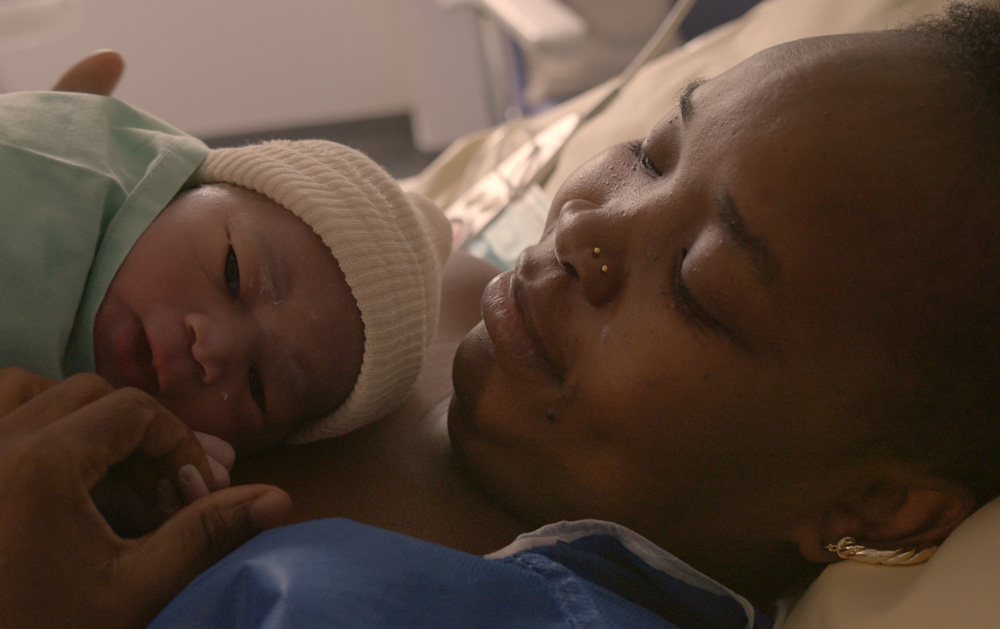“The importance of what I film is bigger than the fact of filming,” Claire Simon said following a recent screening of “Our Body” in Los Angeles, explaining how she was able to achieve such remarkably intimate access to a hospital’s gynecology ward in her native France. She never saw herself as a fly on the wall, knowing full well that she was intruding on private moments in which women were in deeply vulnerable situations, but beyond being one of the country’s most respected filmmakers who was entrusted by hospital administration to film with discretion, patients would know even if they were there to discuss pregnancies or infertility or diagnoses that could be potentially terminal or change the course of their life forever, that in sharing their story, someone else could know they’re going through the same thing and even the worst news they could receive might have value.
As a friend once told Simon, men only go to clinics only when they’re feel something’s wrong, but for women it’s with far more regularity, and yet somehow it’s rarely touched upon in movies and never to the degree that is in “Our Body,” a truly magnificent panorama of patients that reflects not only the various health issues that are specific to the fairer sex but the additional complications they face in a society which rarely accommodates them. Simon sits in as conversations between physicians and those they care for can quickly turn from the biological to the personal when a failure to conceive can be looked upon as a fault of the one with the uterus and doctors can face even trickier discussions around treatment than the procedures themselves, such as when a 17-year-old less than a year away from requiring the consent of both their parents is held hostage by their disapproving father’s signature for their gender transition. An already fraught tapestry of individual situations and their reverberations for the women experiencing them becomes only more so when Simon has to step out in front of the camera upon receiving treatment herself upon learning during filming that she has breast cancer.
“Our Body” doesn’t shy away from showing the particulars of a C-section or the removal of a lesion caused by endometriosis, but surgeries come across as less exposing than how Simon sensitively observes how health concerns put undue pressures on women who generally take on so many different roles in their families and whether it’s been modesty or a discomfort making these private issues public that has prevented a greater awareness, the film is a revelation for how much it shows and Simon placing it all into a context that covers the gamut of age and socioeconomic standing. It would be a triumph for that reason alone, but when speaking to stories that have been denied a proper airing for far too long, it has to be especially sweet for Simon that “Our Body” has become just her second to receive U.S. distribution in a three-decade-plus career after its celebrated premiere at Berlinale earlier this year, it has become just Simon’s second. (Her first, “The Competition,” a must-see about France’s premier film school Le Femis, can still be seen on Metrograph-At-Home.)
During her visit to the States, she graciously took the time to talk about how her latest film came together, how she was comforted during her own health scare by what she had learned from filming, and why she feels like she’s only getting started.
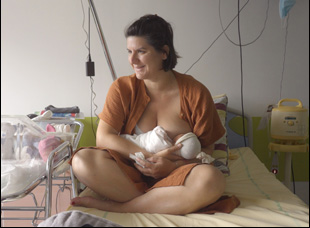
Of course, I’m very interested in women’s lives and women and this producer, as I explained at the beginning of the film, contacted me because I had done a film called “God’s Offices” about the family planning. She loved that film – a fiction film based on documentary recordings and research, and what she told me of her experience in that hospital for two years [where] she went through chemo therapy, really moved me. I was absolutely interested to do that, and all along the shooting, I had what she had told me in my mind. It was a very strong proposition, and I went with it.
This hospital is a complete general hospital. It can cure any kind of disease. It’s not at all a hospital for women, but I was interested in that unit, which was gynecology. And I met the doctors, the heads [of department] and they said, yes, we are something that is very different from all those other pathologies – [we] impact women’s life all the way from their youth to their old age. It’s always something that is linked to [a woman’s] own personal life and everything, so that is the very interesting thing about this unit. I wrote a big [document] with my producer that we sent to all the people, when I had the authorization from the very big institution of hospitals, then I explained to everyone why I wanted to film that unit and what I wanted to try to catch. Everyone was very welcoming and then I had a former student who was my assistant and she and I were asking all the patients if they were okay for me to film the consultations. Some said no, some said yes and some would have said yes, but the husband or the boyfriend was there and say no. I would say, “Look, I’m talking to your girlfriend or to your wife. I’m not talking to you.”
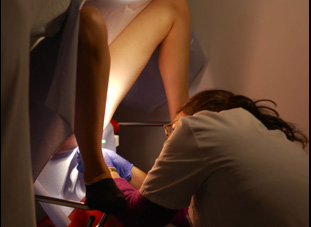
From the beginning, my idea was this arc of life from youth to old age, and after I began to film, I was obsessed by filming the body of the patients, being there when the doctor is touching their body, and also seeing the doctors touch their own body to explain [what they’re trying to diagnose] – this relationship between words and body, all the time,[was interesting]. But I wanted really to show the body, and in the hospital, in surgery, in lots of moments, they cover the body, so it’s not that easy to show, but I wanted to.
Cinema is about showing, about seeing things. And in the surgery, you see what is endometriosis [for instance]. Because when you hear this word, if you are a little bit aware – you know that women are suffering a lot when they have their periods, but when you don’t see it, you don’t understand what is this thing. This is a piece of flesh between different parts of the uterus and the rectum and you have to see it. And then when you see it, it tells you things.
Was it much of a decision to include yourself in the film?
It happened to me after [the initial filming]. I filmed in July and then I began again in September and by the end of September, I knew I was sick. I was not sure I was going to go in that hospital because I thought people will not trust me if I’m sick, but then I changed my mind because I knew all the doctors, so it was much easier for me. I had seen all the protocols. And then, it was the question of the announcement [of the diagnosis] because if you go to see a surgeon or a doctor of cancer, there is a lot of doubt that you may have a cancer, but there is this first consultation where the surgeon is saying to the patient, you have or do not have cancer, and I asked the surgeon, who [ended up doing] my surgery, can I film [another patient experiencing this]? She was a specialist of breast cancer, and she said, no, because I can’t say to the person who is in the waiting room, “Come on, there is a nice little team of documentary and they’re going to film our consultation. And the patient is waiting to know whether it’s good or bad.” So when it happened to me, I thought then I can have the announcement [in the film] for me because I had to do certain exams and I didn’t know how bad it was. I didn’t know if I should have surgery. I didn’t know a lot of things. So I thought, “Now I can do an announcement, it’s my announcement.” And then I did also the consultation with surgeon because I love this woman and she answered all the questions you are asking her. She explained to me what the surgery was going to be and I was naked and I thought I filmed all these women who were naked, so I was at the same level as everyone [else I filmed].
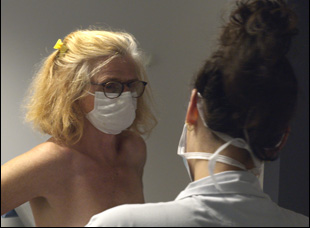
Of course, everything. The gender transition, but also that is what I’m explaining to the doctor when he says the announcement [of my breast cancer] — it changed completely my point of view. If I hadn’t made the film, I would have been completely afraid of my disease. And as I filmed a lot of women who went through cancer and had consultations, I knew what was going to happen, so I had seen other women [react] — bad cases, normal cases, good stories, terrible stories — and I wasn’t afraid that much anymore because I knew other women who had gone through it. And I hope that some viewers who see the film would understand more [about it], because it changes your point of view on what’s happening to you when you know what’s happening to the others, even if it’s not at all the same. But you understand. You don’t get malediction.
The situations are very strong all the time [in a hospital]. That’s why it’s very human because they impact a lot of lives. They’re not that easy. If you’re nearly homeless and you have diabetes — and this woman [who is in the film], for example, lives in a hotel and she cannot get proper food for her disease and as a pregnant woman, it’s important to control the diabetes. [These situations are happening] all the time, like the consultation with this woman from Senegal. She was married to a man who had 30 years [older] than her, and she had already three children, and when comes this question, which is important for giving birth, are you circumcised? And she says, yes. And suddenly when I was shooting, I was thinking, “Oh my God, she has three children. She’s going to have a fourth and she never had any pleasure. It’s a nightmare. And this woman took the chance that I was filming to tell the world of our experience. I was really touched all the time by these situations.
The footage is so powerful, there’s no need for augmentation, but music plays a very gentle, effective role in the film. What went into deciding you wanted it in a few places you did, often this percussive pitter-patter as scene transitions?
There was no music until the end, and in that scene where the patient [with cervical cancer] is so funny, she’s so happy to have me filming, and then there is [the terminal patient], and the piano is there for her to go to sleep. I was at a friend’s place who was working on the sound and he had this instrument and I asked him to do the music like this British sound, it’s a noise music, but it was nice to have this little distance that it gave. And the end song [Camille’s “Ta Doleur”] is a song that we all love in France. It was a big hit and it says, “I’m going to take your pain, and I thought it was so strong for the film.
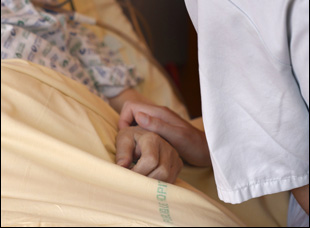
Well, I think we have a lot to do as women, and it’s very strange. I feel that there is more machismo in cinema now than it was before. Because probably men are afraid. I don’t know. But I find it very difficult to be respected, and to have my films shown properly. I’m so glad [“Our Body”] is released here [in America]. I’m really very proud, but I think there is a lot to do. I remember this interview of Jane Campion saying, “But these stories of women have not been told. We have huge work to do.” And this is what I feel. And it’s not only women. I’m actually doing a film about very young children at school [now], all sons of immigrants, but I love to do that. I love making films. It’s a big relief for me.
“Our Body” opens on August 4th in New York at Film Forum and expands on August 11th to Los Angeles at the Lumiere Music Hall, Toronto at the Ted Rogers Hot Docs Cinema and Columbus, Ohio at the Wexner Center for the Arts, August 22nd and 23rd at the Westhampton Beach Performing Arts Center in New York State, August 25th at the Lightbox Film Center in Philadelphia, August 30th through September 3rd at the Northwest Film Forum and August 31st at the Cinematheque in Vancouver.




